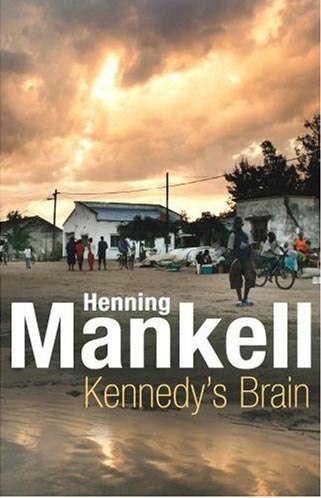
EURO CRIME
Reviews

Mankell, Henning - 'Kennedy's Brain' (translated by Laurie Thompson)
Hardback: 336 pages (Sep. 2007) Publisher: Harvill Secker ISBN: 1846550300
KENNEDY'S BRAIN is a further non-series thriller by Henning Mankell. Set primarily in Mozambique (but also taking in Greece, Sweden, and Spain) KENNEDY'S BRAIN follows its archaeologist heroine, Louise Kantor, as she desperately tries to investigate the death of her son, Henrik.
Although the police and pathologist agree that Henrik's death was suicide (he died from a barbiturate overdose) Louise refuses to accept their verdict. Small details seem awry (Henrik is found in pyjamas in bed, when he preferred to sleep naked, and the bedsheets have mysteriously vanished). Louise therefore traces Henrik's past, in order to find out who could have wanted to kill him.
As she searches through Henrik's documents and correspondence she realises how little he really confided in her. She soon finds out that Henrik was HIV positive, and that he not only had girlfriends but a flat in Barcelona that he never mentioned to her. More mysteriously, Henrik has a large collection of documents regarding the disappearance of John F Kennedy's brain following his assassination (hence the title KENNEDY'S BRAIN). She then travels to Mozambique to meet Henrik's girlfriend Lucinda, encountering a slightly unsavoury Swedish diplomat, Hakansson, who was friendly with Henrik, and visiting a depressing hospice for dying Aids sufferers, where Henrik had worked as a volunteer, run by a secretive American millionaire. Mankell displays a similar distrust of the medical research establishment and pharmacological companies as John Le Carre in his novel THE CONSTANT GARDENER, which touches upon similar themes.
It is clear from the afterword and the back cover information that Henning Mankell cares passionately about Africa and the plight of its Aids sufferers, and this is reflected in the tempo of the novel. I found the European sections of the book slightly slow going (apart from the touching depiction of Louise's visit to her father in the far north of Sweden), and that the book really came into its stride once Louise travels to Mozambique. Henning Mankell writes very convincingly about the culture clash Louise encounters between her priorities and those of Lucinda, Henrik's girlfriend, and very movingly about the Aids hospice and its patients. KENNEDY'S BRAIN contains the usual Mankell thoughtful and moral tone, and sometimes high flown dialogue. The high flown dialogue makes it a little hard for the reader to empathise with Henrik, as we see his "dialogue" in letter/note form, without glimpsing the more prosaic day to day thoughts and activities which would round his character out more.
KENNEDY'S BRAIN is a rather unusual thriller, suffused with grief and ambiguity, and eschewing a neat resolution. Some readers may find the lack of definite ending disappointing, but I found this refreshingly lifelike.
Read another review of KENNEDY'S BRAIN.
Laura Root, England
November 2007